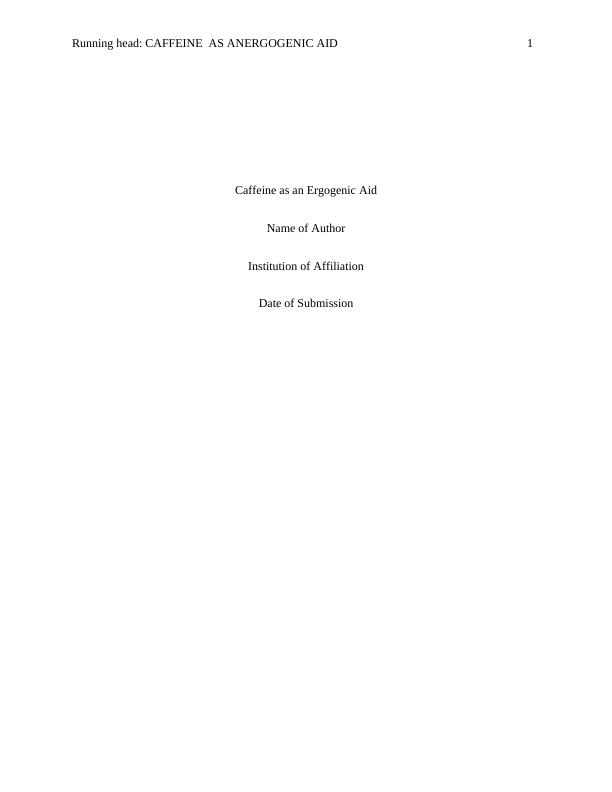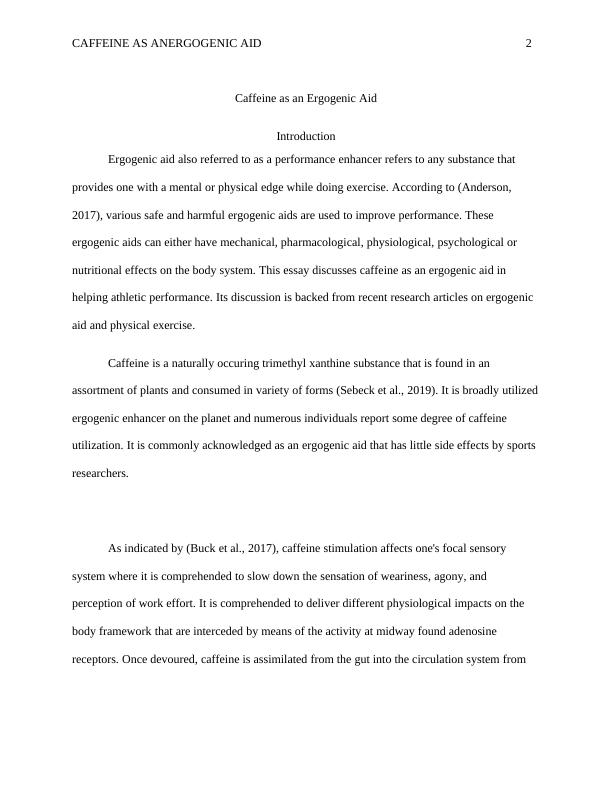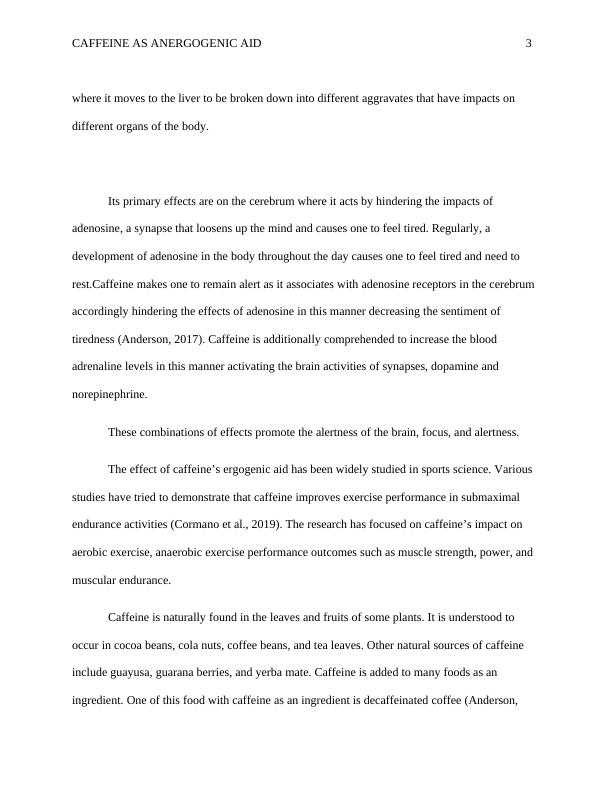CAFFEINE AS ANERGOGENIC AID
Added on 2022-09-03
6 Pages1417 Words45 Views
Running head: CAFFEINE AS ANERGOGENIC AID 1
Caffeine as an Ergogenic Aid
Name of Author
Institution of Affiliation
Date of Submission
Caffeine as an Ergogenic Aid
Name of Author
Institution of Affiliation
Date of Submission

CAFFEINE AS ANERGOGENIC AID 2
Caffeine as an Ergogenic Aid
Introduction
Ergogenic aid also referred to as a performance enhancer refers to any substance that
provides one with a mental or physical edge while doing exercise. According to (Anderson,
2017), various safe and harmful ergogenic aids are used to improve performance. These
ergogenic aids can either have mechanical, pharmacological, physiological, psychological or
nutritional effects on the body system. This essay discusses caffeine as an ergogenic aid in
helping athletic performance. Its discussion is backed from recent research articles on ergogenic
aid and physical exercise.
Caffeine is a naturally occuring trimethyl xanthine substance that is found in an
assortment of plants and consumed in variety of forms (Sebeck et al., 2019). It is broadly utilized
ergogenic enhancer on the planet and numerous individuals report some degree of caffeine
utilization. It is commonly acknowledged as an ergogenic aid that has little side effects by sports
researchers.
As indicated by (Buck et al., 2017), caffeine stimulation affects one's focal sensory
system where it is comprehended to slow down the sensation of weariness, agony, and
perception of work effort. It is comprehended to deliver different physiological impacts on the
body framework that are interceded by means of the activity at midway found adenosine
receptors. Once devoured, caffeine is assimilated from the gut into the circulation system from
Caffeine as an Ergogenic Aid
Introduction
Ergogenic aid also referred to as a performance enhancer refers to any substance that
provides one with a mental or physical edge while doing exercise. According to (Anderson,
2017), various safe and harmful ergogenic aids are used to improve performance. These
ergogenic aids can either have mechanical, pharmacological, physiological, psychological or
nutritional effects on the body system. This essay discusses caffeine as an ergogenic aid in
helping athletic performance. Its discussion is backed from recent research articles on ergogenic
aid and physical exercise.
Caffeine is a naturally occuring trimethyl xanthine substance that is found in an
assortment of plants and consumed in variety of forms (Sebeck et al., 2019). It is broadly utilized
ergogenic enhancer on the planet and numerous individuals report some degree of caffeine
utilization. It is commonly acknowledged as an ergogenic aid that has little side effects by sports
researchers.
As indicated by (Buck et al., 2017), caffeine stimulation affects one's focal sensory
system where it is comprehended to slow down the sensation of weariness, agony, and
perception of work effort. It is comprehended to deliver different physiological impacts on the
body framework that are interceded by means of the activity at midway found adenosine
receptors. Once devoured, caffeine is assimilated from the gut into the circulation system from

CAFFEINE AS ANERGOGENIC AID 3
where it moves to the liver to be broken down into different aggravates that have impacts on
different organs of the body.
Its primary effects are on the cerebrum where it acts by hindering the impacts of
adenosine, a synapse that loosens up the mind and causes one to feel tired. Regularly, a
development of adenosine in the body throughout the day causes one to feel tired and need to
rest.Caffeine makes one to remain alert as it associates with adenosine receptors in the cerebrum
accordingly hindering the effects of adenosine in this manner decreasing the sentiment of
tiredness (Anderson, 2017). Caffeine is additionally comprehended to increase the blood
adrenaline levels in this manner activating the brain activities of synapses, dopamine and
norepinephrine.
These combinations of effects promote the alertness of the brain, focus, and alertness.
The effect of caffeine’s ergogenic aid has been widely studied in sports science. Various
studies have tried to demonstrate that caffeine improves exercise performance in submaximal
endurance activities (Cormano et al., 2019). The research has focused on caffeine’s impact on
aerobic exercise, anaerobic exercise performance outcomes such as muscle strength, power, and
muscular endurance.
Caffeine is naturally found in the leaves and fruits of some plants. It is understood to
occur in cocoa beans, cola nuts, coffee beans, and tea leaves. Other natural sources of caffeine
include guayusa, guarana berries, and yerba mate. Caffeine is added to many foods as an
ingredient. One of this food with caffeine as an ingredient is decaffeinated coffee (Anderson,
where it moves to the liver to be broken down into different aggravates that have impacts on
different organs of the body.
Its primary effects are on the cerebrum where it acts by hindering the impacts of
adenosine, a synapse that loosens up the mind and causes one to feel tired. Regularly, a
development of adenosine in the body throughout the day causes one to feel tired and need to
rest.Caffeine makes one to remain alert as it associates with adenosine receptors in the cerebrum
accordingly hindering the effects of adenosine in this manner decreasing the sentiment of
tiredness (Anderson, 2017). Caffeine is additionally comprehended to increase the blood
adrenaline levels in this manner activating the brain activities of synapses, dopamine and
norepinephrine.
These combinations of effects promote the alertness of the brain, focus, and alertness.
The effect of caffeine’s ergogenic aid has been widely studied in sports science. Various
studies have tried to demonstrate that caffeine improves exercise performance in submaximal
endurance activities (Cormano et al., 2019). The research has focused on caffeine’s impact on
aerobic exercise, anaerobic exercise performance outcomes such as muscle strength, power, and
muscular endurance.
Caffeine is naturally found in the leaves and fruits of some plants. It is understood to
occur in cocoa beans, cola nuts, coffee beans, and tea leaves. Other natural sources of caffeine
include guayusa, guarana berries, and yerba mate. Caffeine is added to many foods as an
ingredient. One of this food with caffeine as an ingredient is decaffeinated coffee (Anderson,

End of preview
Want to access all the pages? Upload your documents or become a member.
